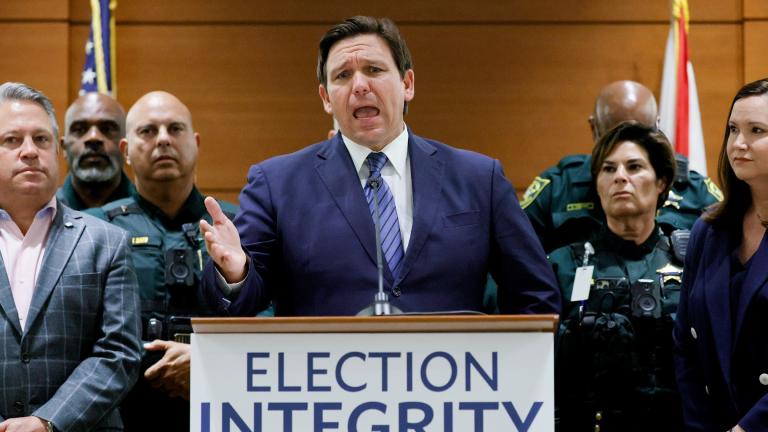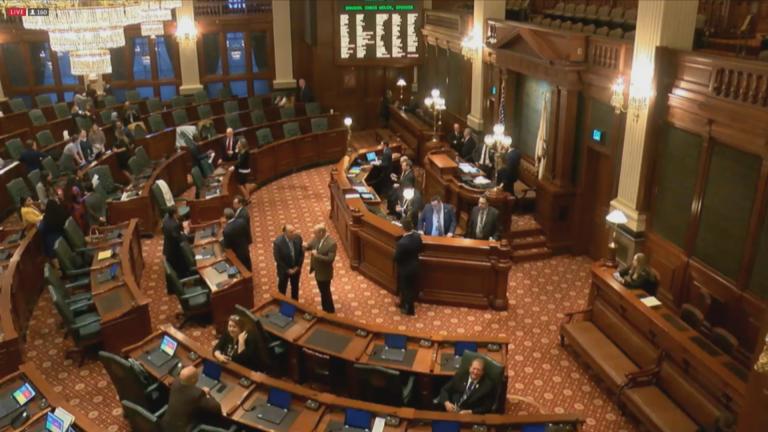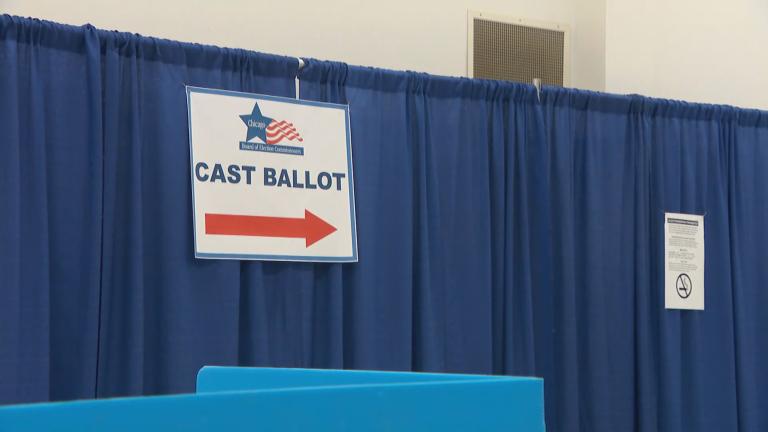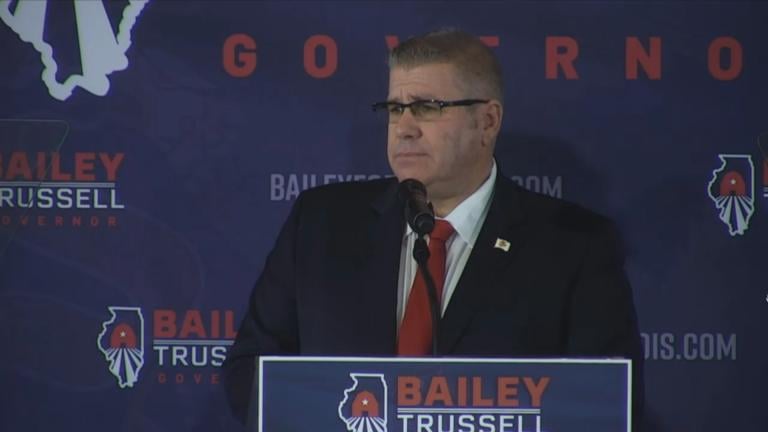 (WTTW News)
(WTTW News)
If there was still any question that Chicago’s suburbs are no longer the Republican bastion they once were, that notion was firmly supported Tuesday when GOP legislative candidates took a walloping.
Election results ensure Democrats will hold onto their super-majorities in the Illinois General Assembly.
House Minority Leader Jim Durkin was quick to respond to the bad night for Illinois Republicans.
“While I am not pleased with the results, I will accept them,” he said.
But going forward, Durkin will no longer have the chief responsibility for guiding the caucus and propping up candidates. The Western Springs legislator sent a statement Wednesday morning saying he will not run again for the leadership position.
“The House Republicans ran on the message of fighting for lower taxes and safer communities for families and businesses across the state, and I am proud of all our campaigns who fought hard over the last year. I congratulate all of the Republicans who will now represent these important voices in the General Assembly and fight against the Democratic Party of Illinois,” the statement reads. “It has been the honor of a lifetime to serve as Leader of the House Republican caucus, but it's time for the Illinois Republican Party to rebuild with new leaders who can bring independents back to the party that are needed to bring change to the state.”
Overriding a veto requires a super-majority of 71 votes. Democrats now look to have a 73-45 advantage in the House after results from Tuesday stand to give Democratic House Speaker Emanuel “Chris” Welch several more members, according to the unofficial numbers.
Democrats will likewise keep super-majority status in the Illinois Senate.
“The people have spoken. Now it’s time to get to work governing,” Senate President Don Harmon said in a statement late Tuesday night. “Illinois Senate Democrats are committed to responsible state budgets that prioritize funding for schools, health care and public safety; meaningful ethics reforms; and equality of opportunity for all Illinoisans through job creation and community investment. These principles guide our caucus through thick and thin.”
The top Republican in the Illinois Senate, Dan McConchie, has to make it out of his own contest. With all precincts in, has a 51.1% lead over challenger Maria Peterson, with 48.9% of the vote.
Senate Republicans lost the state’s most expensive state legislative race, with Sen. Doris Turner, D-Springfield, leading state Rep. Sandy Hamilton, who is also from the capital city.
Durkin’s retreat as minority leader will create a scramble among House Republicans over who’ll be their next leader. Also at stake is the direction the caucus will take in the future, given a festering schism between moderates, like Durkin, and conservatives known as the “Eastern Block” who have close ties to GOP nominee for governor Darren Bailey.
Some Republican moderates were wiped out in Tuesday’s races. Among them were incumbent Republican state Reps. Keith Wheeler of Oswego (bested by Democrat Matt Hanson), and Chris Bos of Lake Zurich (trailing Nabeela Syed), though GOP state Rep. Mike Marron, who is from outside Danville, appears to have narrowly beat a challenge from Democrat Cynthia Cunningham.
Incumbent Democratic representatives who held onto their seats after what had been expected to be tough Republican challenges include: Terra Costa Howard of Glen Ellyn (over Stephanie Hood), Janet Yang Rohr of Naperville (over Richard Janor), Mark Walker of Arlington Heights (over Jack Vrett), Marty Moylan of Des Plaines (over Michael Lupo), Suzanne Ness of Crystal Lake (over Connie Cain), Lance Yednock of Ottowa (over Jason Haskell), and Katie Stuart of downstate Glen Carbon (over Jennifer Korte of Edwardsville).
Republicans are also expected to lose House seats the party currently holds. Democrat Marty Beth Canty, an Arlington Heights trustee, won against Republican Michele Hunter in the seat currently held by GOP Rep. Tom Morrison.
Democrat Harry Benton has a two-point lead over Republican Michelle Smith in a seat left open by Republican state Rep. Mark Batinick.
Some races are still close, and could be impacted by mail-in ballots that will trickle in for the next couple of weeks, such as in the new 45th District, where as of Wednesday morning Republican Rep. Deanne Mazzochi of Elmhurst holds only a .4 percentage point lead over Democrat Jenn Ladisch Douglass.
In a rare upset, Democrat Rep. LaToya Greenwood, a lifelong resident of East St. Louis, is trailing Republican challenger Kevin Schmidt in the 114th District.
All election results are unofficial, and mail-in ballots can trickle in for weeks.
Democrats designed the state districts, and used their control of state government during the once-in-a-decade, post-census redistricting process to draw the boundaries to their advantage.
Republicans also had a significant financial disadvantage in most races.
Wealthy Democratic Gov. J.B. Pritzker buttressed legislative candidates’ campaigns by giving $8 million to the Welch-led Democrats for the Illinois House Campaign fund, $2.75 million to the Harmon-led Senate Democratic Victory Fund, and $7.86 million to an umbrella organization.
Meanwhile, Durkin’s campaign arm was left relatively dry when hedge fund billionaire Ken Griffin left Illinois for Florida after Bailey won the gubernatorial primary despite Griffin’s $50 million investment in Aurora Mayor Richard Irvin.
Democrats also triumphed in hotly contested county races, with state Rep. Deb Conroy is set to become the first Democrat and woman to chair the DuPage County Board. With 100% of precincts reporting, Conroy holds a 50.8% to 49.2% lead over management consultant and Republican board member Greg Hart.
DuPage’s Democratic County Clerk Jean Kaczmarek holds a wider lead over Evelyn Sanguinetti, who served from 2014-2018 as lieutenant governor under Republican Gov. Bruce Rauner.
Follow Amanda Vinicky on Twitter: @AmandaVinicky








